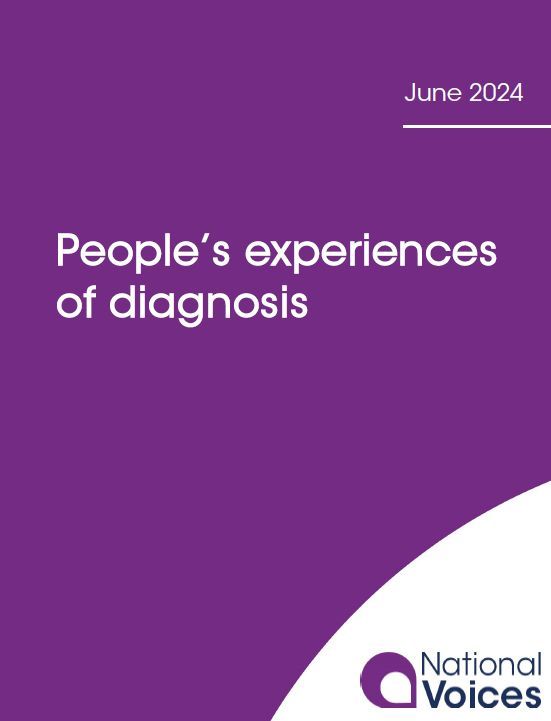
People’s experiences of diagnosis
- Our vision for improving patient experience of diagnosis
- Digital health and care
- Health inequalities
- Person-centred care
- Communication and administration
- Hospital waiting lists
‘Diagnosis’ is the process of identifying a disease, condition, or injury from its signs and symptoms. But the process of diagnosing someone is more than just figuring out what is clinically wrong with them. It is a process that is full of important learning moments for patients and the NHS.
At National Voices, we hear time and time again that diagnosis is not working for patients. Not only is the process of getting a diagnosis becoming increasingly challenging, but the wrap-around support is simply not there. This is having a significant impact on patient care and the journey experienced by many post-diagnosis.
People’s experiences of diagnosis brings together insights from people with lived experience and our members on the entire process of diagnosis – from trying to get an appointment for a diagnostic referral, to undergoing tests, and experiences post-diagnosis.
The report covers the themes of challenges in diagnosis, inequalities in diagnosis, and new innovation in diagnosis, before concluding with nine recommendations for improving patient experience of diagnosis.
These nine recommendations include:
- Adjustments and adaptations to enable access
- Provide better support while waiting
- Listen to the patient
- Better communication around diagnosis
- Make sure people have a plan
- Provide access to support groups
- Collect better data to understand the drivers of diagnostic health inequalities, and act on it rapidly
- Upskill, coordinate and ultimately increase the workforce
- Have health equity embedded into new innovations from the start
We believe implementing these recommendations will significantly improve people’s experiences of not only diagnosis but health and care more widely.
While people respond in different ways, being diagnosed with a health condition, whether treatable or not, can be a life-changing time. It’s therefore vital that people are well supported and empowered throughout the process and beyond.
If you would like to read this report in an alternative format, please get in touch.
Our vision for improving patient experience of diagnosis
We have taken the nine recommendations from People’s experiences of diagnosis and used this to form Our vision for improving patient experience of diagnosis.
Our vision has been signed and endorsed by 58 of our members – read more here.
Acknowledgements
Johnson & Johnson Innovative Medicine provided a grant towards this project and had no input into the project or this report.
We would like to thank our member organisations and people with lived experience for sharing their insights and inputting on this work, including Age UK, Allergy UK, Alzheimer’s Society, Asthma+Lung UK, Compassion in Dying, Crohn’s & Colitis, Dementia UK, Diabetes UK, Endometriosis UK, Equally Well UK, Juvenile Arthritis Research, Macular Society, Myaware, National Axial Spondyloarthritis Society, National Rheumatoid Arthritis Society, Pancreatic Cancer, Parkinson’s UK, Prostate Cancer UK, Resuscitation Council UK, Rethink Mental Illness, Shine Cancer Support, Stickler Syndrome UK, Stroke Association, The Neurological Alliance, Thomas Pocklington Trust, Thyroid Trust, and others.

Related members and partners
-
Pancreatic Cancer UK
-
Macular Society
-
Thyroid Trust
-
Thomas Pocklington Trust
-
Stroke Association
-
Stickler Syndrome UK
-
Shine Cancer Support
-
Rethink Mental Illness
-
Resuscitation Council UK
-
Prostate Cancer UK
-
Parkinson’s UK
-
The Neurological Alliance
-
National Rheumatoid Arthritis Society (NRAS)
-
National Axial Spondyloarthritis Society (NASS)
-
Myaware
-
Juvenile Arthritis Research
-
Equally Well
-
Endometriosis UK
-
Diabetes UK
-
Dementia UK
-
Crohn’s and Colitis UK
-
Compassion in Dying
-
Asthma + Lung UK
-
Alzheimer’s Society
-
Allergy UK
-
Age UK